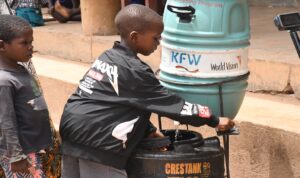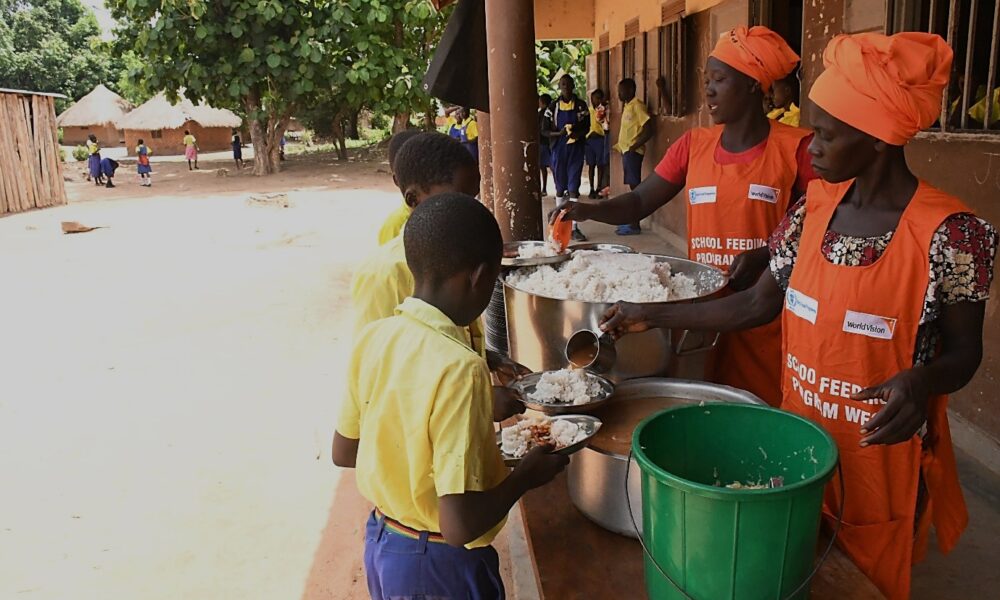By William Madouk
Schools in Yambio County, Western Equatoria State, have recorded increased enrolment, thanks to school feeding program.
Zerufa Philip Nyanzio, chairperson for the school feeding program at the state ministry of education, lauds, saying it has boosted class attendance and reduced dropout rate.
“Before the school feeding program, the performance was really poor because most of the students did not attend the lessons,” Zerufa said.
“You see now, students cannot absent themselves because when they eat at school, they go up to the evening very satisfied, and when they reach home, they are already okay and start revising what they have learned,” she added.
She appealed to the partners to extend the feeding program to at least 10 or 15 schools, adding that WFP and World Vision were backups to 16 schools but later dropped to only 4 schools.
“If you see four schools with the feeding program, they are really healthy and progressing,” she acclaimed.
Ms. Zerufa also encourages all schools to adopt a homegrown school garden to help kids with feeding.
Bidal Emmanuel, 16, a pupil of St. Bakhita Primary, said they no longer miss classes.
“We are having a balanced diet in school; we eat cassava leaves, tomatoes, cabbage, and beans at a time when we don’t even like the food that we are eating at home,” said Emmanuel, who is in P7.
According to him, the feeding program has reduced the burden on their parents, adding that the money they could have spent on buying food during break and lunchtime is now used to pay school fees.
Emmanuel, who is now performing better in class, has a new feeding program to thank for the change in his academic fortune.
“The program has improved my performance; before, I was very lazy in the class and I was not even passing exams, but when the feeding program was initiated, I topped the class, unlike before, where I could not participate in the top 10,” he lauded.
He appealed to the partners to continue with the feeding program and extend it to the rest of the schools.
Also, Siama Juan, 13, a pupil at St. Bakhita, appreciated the UN World Food Programme and partners for the introduction of the feeding program.
“Before the program, the children were failing, but now students are not failing like previously,” said Juan, who is also a Form 7 pupil.
She added that they had embarked on a homegrown school garden that helped them practice farming skills.

Meanwhile, St. Bakhitia Nursery and Primary School headmaster, Angelo Ateny Awach explained that the feeding program has been running since 2019.
He stated that the introduction of cash-based transfer (CBT) and feeding programs has increased enrollment and improved pupils’ performances.
“In 2023, we had a number of learners of 1,181, and this year we have a number of learners of 1, 231,” Awach said.
“This year, we have received food items—two times—and the total amount we receive to buy those items is SSP 9, 478, 150,” he revealed.
According to Awach, impact of the project is that the money was used to procure products from local farmers and parents, who, in return, could pay their kids’ school fees.
According Parents and Teacher Association (PTA) representative, Mr. Anthony Ermeno, the feeding program has helped the children.
He described that, as parents, they have also benefited from the project because WFP purchases their produce.
WFP implements the project with support from the Garman government through KFW.
So far, WFP has already procured 650 metric tons of white maize in Western Equatoria State.
Equally, the WFP is implementing a school feeding program in Northern Bahr El-Ghazal State.




